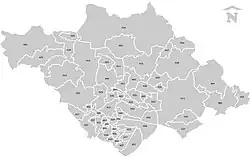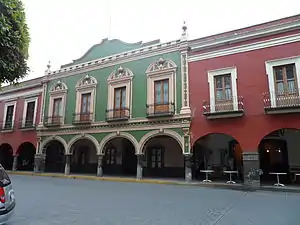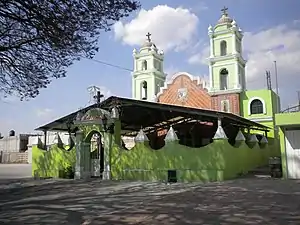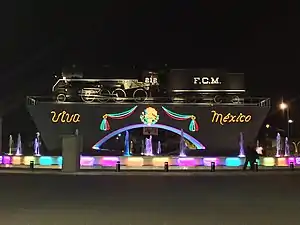Municipalities of Tlaxcala
Tlaxcala is a state in Central Mexico that is divided into 60 municipalities. According to the 2020 Mexican Census, it is the fifth least populated state with 1,342,977 inhabitants and the 2nd smallest by land area spanning 3,996.6 square kilometres (1,543.1 sq mi).[1][2]
.svg.png.webp)

Municipalities in Tlaxcala are administratively autonomous of the state according to the 115th article of the 1917 Constitution of Mexico.[3] Every three years, citizens elect a municipal president (Spanish: presidente municipal) by a plurality voting system who heads a concurrently elected municipal council (ayuntamiento) responsible for providing all the public services for their constituents. The municipal council consists of a variable number of trustees and councillors (regidores y síndicos).[4] Municipalities are responsible for public services (such as water and sewerage), street lighting, public safety, traffic, and the maintenance of public parks, gardens and cemeteries.[5] They may also assist the state and federal governments in education, emergency fire and medical services, environmental protection and maintenance of monuments and historical landmarks. Since 1984, they have had the power to collect property taxes and user fees, although more funds are obtained from the state and federal governments than from their own income.[5]
The largest municipality by population is Tlaxcala, with 99,896 residents (7.43% of the state total), while the smallest is San Lucas Tecopilco with 3,077 residents.[1] The largest municipality by land area is Tlaxco which spans 574.70 km2 (221.89 sq mi), and the smallest is San Lorenzo Axocomanitla with 4.50 km2 (1.74 sq mi).[2] 16 new municipalities were created in 1995, the most recent being Benito Juárez, established in October 9 of that year.[6]
Municipalities
- Largest municipalities in Tlaxcala by population
 Tlaxcala, capital and largest municipality by population in Tlaxcala.
Tlaxcala, capital and largest municipality by population in Tlaxcala. Huamantla, second largest municipality by population.
Huamantla, second largest municipality by population. San Pablo del Monte, third largest municipality by population.
San Pablo del Monte, third largest municipality by population. Apizaco, fourth largest municipality by population.
Apizaco, fourth largest municipality by population.
| Name | Municipal seat | Population (2020)[1] |
Population (2010)[7] |
Change | Land area[2] | Population density (2020) |
Incorporation date[6] | |
|---|---|---|---|---|---|---|---|---|
| km2 | sq mi | |||||||
| Acuamanala[lower-alpha 1] | Acuamanala | 6,432 | 5,711 | +12.6% | 15.0 | 5.8 | 428.8/km2 (1,110.6/sq mi) | September 9, 1934 |
| Amaxac[lower-alpha 2] | Amaxac de Guerrero | 11,403 | 9,875 | +15.5% | 11.2 | 4.3 | 1,018.1/km2 (2,636.9/sq mi) | May 31, 1902 |
| Apetatitlán | Apetatitlán | 16,003 | 13,361 | +19.8% | 11.6 | 4.5 | 1,379.6/km2 (3,573.1/sq mi) | February 14, 1832 |
| Apizaco[lower-alpha 3] | Apizaco | 80,725 | 76,492 | +5.5% | 43.6 | 16.8 | 1,851.5/km2 (4,795.3/sq mi) | May 9, 1873 |
| Atlangatepec | Atlangatepec | 7,087 | 6,018 | +17.8% | 108.2 | 41.8 | 65.5/km2 (169.6/sq mi) | June 26, 1871 |
| Atltzayanca | Atltzayanca | 18,111 | 15,935 | +13.7% | 189.8 | 73.3 | 95.4/km2 (247.1/sq mi) | June 26, 1871 |
| Benito Juárez | Benito Juárez | 6,211 | 5,687 | +9.2% | 25.6 | 9.9 | 242.6/km2 (628.4/sq mi) | October 9, 1995 |
| Calpulalpan | Calpulalpan | 51,172 | 44,807 | +14.2% | 253.9 | 98.0 | 201.5/km2 (522.0/sq mi) | 1826 |
| Chiautempan | Santa Ana Chiautempan | 73,215 | 66,149 | +10.7% | 77.2 | 29.8 | 948.4/km2 (2,456.3/sq mi) | February 14, 1832 |
| Contla | Contla | 38,579 | 35,084 | +10.0% | 26.1 | 10.1 | 1,478.1/km2 (3,828.3/sq mi) | February 14, 1832 |
| Cuapiaxtla | Cuapiaxtla | 16,222 | 13,671 | +18.7% | 82.6 | 31.9 | 196.4/km2 (508.7/sq mi) | February 14, 1832 |
| Cuaxomulco | Cuaxomulco | 5,928 | 5,066 | +17.0% | 16.7 | 6.4 | 355.0/km2 (919.4/sq mi) | January 1, 1936 |
| El Carmen Tequexquitla | Villa de El Carmen Tequexquitla | 17,332 | 15,368 | +12.8% | 58.4 | 22.5 | 296.8/km2 (768.7/sq mi) | August 11, 1857 |
| Emiliano Zapata | Emiliano Zapata | 4,951 | 4,146 | +19.4% | 50.1 | 19.3 | 98.8/km2 (255.9/sq mi) | September 27, 1995 |
| Españita[lower-alpha 4] | Españita | 9,416 | 8,399 | +12.1% | 139.7 | 53.9 | 67.4/km2 (174.6/sq mi) | June 4, 1867 |
| Huamantla | Huamantla | 98,764 | 84,979 | +16.2% | 348.8 | 134.7 | 283.2/km2 (733.4/sq mi) | February 14, 1832 |
| Hueyotlipan | Hueyotlipan | 15,190 | 13,879 | +9.4% | 176.0 | 68.0 | 86.3/km2 (223.5/sq mi) | February 14, 1832 |
| Ixtacuixtla[lower-alpha 5] | Villa Mariano Matamoros | 38,970 | 35,162 | +10.8% | 161.5 | 62.4 | 241.3/km2 (625.0/sq mi) | February 14, 1832 |
| Ixtenco[lower-alpha 6] | Ixtenco | 7,504 | 6,791 | +10.5% | 44.4 | 17.1 | 169.0/km2 (437.7/sq mi) | February 14, 1832 |
| La Magdalena Tlaltelulco | La Magdalena Tlaltelulco | 19,036 | 16,834 | +13.1% | 11.8 | 4.6 | 1,613.2/km2 (4,178.2/sq mi) | August 18, 1995 |
| Lázaro Cárdenas | Lázaro Cárdenas | 3,534 | 2,769 | +27.6% | 25.4 | 9.8 | 139.1/km2 (360.4/sq mi) | September 27, 1995 |
| Mazatecochco[lower-alpha 7] | Mazatecochco | 11,592 | 9,740 | +19.0% | 14.6 | 5.6 | 794.0/km2 (2,056.4/sq mi) | January 14, 1943 |
| Muñoz[lower-alpha 8] | Muñoz | 4,755 | 4,285 | +11.0% | 36.4 | 14.1 | 130.6/km2 (338.3/sq mi) | October 21, 1953 |
| Nanacamilpa[lower-alpha 9] | Nanacamilpa | 18,686 | 16,640 | +12.3% | 108.2 | 41.8 | 172.7/km2 (447.3/sq mi) | December 9, 1942 |
| Natívitas | Natívitas | 26,309 | 23,621 | +11.4% | 52.5 | 20.3 | 501.1/km2 (1,297.9/sq mi) | February 14, 1832 |
| Panotla[lower-alpha 10] | Panotla | 28,357 | 25,128 | +12.9% | 61.0 | 23.6 | 464.9/km2 (1,204.0/sq mi) | February 14, 1832 |
| Papalotla | Papalotla | 33,499 | 26,997 | +24.1% | 23.2 | 9.0 | 1,443.9/km2 (3,739.7/sq mi) | January 1, 1880 |
| San Damián Texóloc | San Damián Texóloc | 5,884 | 5,064 | +16.2% | 10.2 | 3.9 | 576.9/km2 (1,494.1/sq mi) | September 27, 1995 |
| San Francisco Tetlanohcan | San Francisco Tetlanohcan | 11,761 | 9,880 | +19.0% | 39.5 | 15.3 | 297.7/km2 (771.2/sq mi) | August 18, 1995 |
| San Jerónimo Zacualpan | San Jerónimo Zacualpan | 4,092 | 3,581 | +14.3% | 7.8 | 3.0 | 524.6/km2 (1,358.7/sq mi) | September 27, 1995 |
| San José Teacalco | San José Teacalco | 6,436 | 5,660 | +13.7% | 36.0 | 13.9 | 178.8/km2 (463.0/sq mi) | August 18, 1995 |
| San Juan Huactzinco | San Juan Huactzinco | 7,688 | 6,821 | +12.7% | 4.6 | 1.8 | 1,671.3/km2 (4,328.7/sq mi) | August 11, 1995 |
| San Lorenzo Axocomanitla | San Lorenzo Axocomanitla | 5,689 | 5,045 | +12.8% | 4.5 | 1.7 | 1,264.2/km2 (3,274.3/sq mi) | October 2, 1995 |
| San Lucas Tecopilco | San Lucas Tecopilco | 3,077 | 2,833 | +8.6% | 28.8 | 11.1 | 106.8/km2 (276.7/sq mi) | October 2, 1995 |
| San Pablo del Monte | San Pablo del Monte | 82,688 | 69,615 | +18.8% | 59.7 | 23.1 | 1,385.1/km2 (3,587.3/sq mi) | February 14, 1832 |
| Sanctórum[lower-alpha 11] | Sanctórum | 9,432 | 8,474 | +11.3% | 99.2 | 38.3 | 95.1/km2 (246.3/sq mi) | March 28, 1935 |
| Santa Ana Nopalucan | Santa Ana Nopalucan | 7,952 | 6,857 | +16.0% | 9.2 | 3.6 | 864.3/km2 (2,238.7/sq mi) | October 2, 1995 |
| Santa Apolonia Teacalco | Santa Apolonia Teacalco | 4,636 | 4,349 | +6.6% | 8.0 | 3.1 | 579.5/km2 (1,500.9/sq mi) | August 9, 1995 |
| Santa Catarina Ayometla | Santa Catarina Ayometla | 9,463 | 7,992 | +18.4% | 10.1 | 3.9 | 936.9/km2 (2,426.6/sq mi) | August 15, 1995 |
| Santa Cruz Quilehtla | Santa Cruz Quilehtla | 7,750 | 6,296 | +23.1% | 5.4 | 2.1 | 1,435.2/km2 (3,717.1/sq mi) | August 11, 1995 |
| Santa Cruz Tlaxcala | Santa Cruz Tlaxcala | 24,116 | 17,968 | +34.2% | 25.9 | 10.0 | 931.1/km2 (2,411.6/sq mi) | February 14, 1832 |
| Santa Isabel Xiloxoxtla | Santa Isabel Xiloxoxtla | 5,443 | 4,436 | +22.7% | 6.0 | 2.3 | 907.2/km2 (2,349.6/sq mi) | August 15, 1995 |
| Tenancingo | Tenancingo | 12,974 | 11,763 | +10.3% | 12.5 | 4.8 | 1,037.9/km2 (2,688.2/sq mi) | July 10, 1897 |
| Teolocholco | Teolocholco | 25,257 | 21,671 | +16.5% | 76.6 | 29.6 | 329.7/km2 (854.0/sq mi) | February 14, 1832 |
| Tepetitla | Tepetitla | 22,274 | 18,725 | +19.0% | 23.1 | 8.9 | 964.2/km2 (2,497.4/sq mi) | May 1, 1880 |
| Tepeyanco | Tepeyanco | 13,328 | 11,048 | +20.6% | 16.4 | 6.3 | 812.7/km2 (2,104.8/sq mi) | February 14, 1832 |
| Terrenate | Terrenate | 15,475 | 13,775 | +12.3% | 154.7 | 59.7 | 100.0/km2 (259.1/sq mi) | August 11, 1857 |
| Tetla | Tetla | 35,284 | 28,760 | +22.7% | 169.8 | 65.6 | 207.8/km2 (538.2/sq mi) | February 14, 1832 |
| Tetlatlahuca | Tetlatlahuca | 13,561 | 12,410 | +9.3% | 26.1 | 10.1 | 519.6/km2 (1,345.7/sq mi) | February 14, 1832 |
| Tlaxcala | Tlaxcala de Xicohténcatl | 99,896 | 89,795 | +11.2% | 52.0 | 20.1 | 1,921.1/km2 (4,975.6/sq mi) | February 14, 1832 |
| Tlaxco | Tlaxco | 45,438 | 39,939 | +13.8% | 574.7 | 221.9 | 79.1/km2 (204.8/sq mi) | February 14, 1832 |
| Tocatlán | Tocatlán | 6,294 | 5,589 | +12.6% | 14.3 | 5.5 | 440.1/km2 (1,140.0/sq mi) | September 24, 1952 |
| Totolac | San Juan Totolac | 22,529 | 20,625 | +9.2% | 13.8 | 5.3 | 1,632.5/km2 (4,228.2/sq mi) | November 3, 1906 |
| Tzompantepec[lower-alpha 12] | Tzompantepec | 18,006 | 14,611 | +23.2% | 38.4 | 14.8 | 468.9/km2 (1,214.5/sq mi) | February 14, 1832 |
| Xaloztoc | Xaloztoc | 25,607 | 21,769 | +17.6% | 41.5 | 16.0 | 617.0/km2 (1,598.1/sq mi) | November 25, 1873 |
| Xaltocan | Xaltocan | 10,601 | 9,777 | +8.4% | 102.8 | 39.7 | 103.1/km2 (267.1/sq mi) | February 14, 1832 |
| Xicohtzinco | Xicohtzinco | 14,197 | 12,255 | +15.8% | 7.3 | 2.8 | 1,944.8/km2 (5,037.0/sq mi) | January 15, 1942 |
| Yauhquemehcan[lower-alpha 13] | Yauhquemehcan | 42,242 | 33,081 | +27.7% | 37.4 | 14.4 | 1,129.5/km2 (2,925.3/sq mi) | February 14, 1832 |
| Zacatelco | Zacatelco | 45,717 | 38,654 | +18.3% | 29.5 | 11.4 | 1,549.7/km2 (4,013.8/sq mi) | February 14, 1832 |
| Zitlaltepec[lower-alpha 14] | Zitlaltepec | 9,207 | 8,224 | +12.0% | 77.1 | 29.8 | 119.4/km2 (309.3/sq mi) | February 14, 1832 |
| Tlaxcala | — | 1,342,977 | 1,169,936 | +14.8% | 3,996.6 | 1,543.1 | 336.0/km2 (870.3/sq mi) | — |
| Mexico | — | 126,014,024 | 112,336,538 | +12.2% | 1,960,646.7 | 757,010 | 64.3/km2 (166.5/sq mi) | — |
Notes
- Acuamanala was originally incorporated as Miguel Hidalgo, changing its name on April 1, 1994.[6]
- Amaxac was originally incorporated as Guerrero, changing its name on September 9, 1942.[6]
- Apizaco was originally incorporated as Barrón-Escandón, changing its name on March 3, 1971.[6]
- Españita was merged with Sanctórum for three months in 1931.[6]
- Ixtacuixtla was originally incorporated as San Felipe Yxtacuixtla, changing its name on June 4, 1867.[6]
- Ixtenco was originally incorporated as San Juan Yxtenco, changing its name on June 4, 1867.[6]
- Mazatecochco was originally incorporated as José María Morelos, changing its name on February 1, 1984.[6]
- Muñoz was originally incorporated as Domingo Arenas, changing its name on February 1, 1984.[6]
- Nanacamilpa was originally incorporated as Ing. Manuel Santillán, changing its name to Mariano Arista in 1944 and to its current name on February 1, 1984.[6]
- Panotla was not incorporated as a municipality between 1867 and 1882.[6]
- Sanctórum was originally incorporated as Lázaro Cárdenas, changing its name on February 1, 1984.[6]
- Tzompantepec was originally incorporated as San Salvador Zumpantepec, changing its name on June 4, 1867.[6]
- Yauhquemehcan was originally incorporated as San Dionisio Yeuquemecan, changing its name on June 4, 1867.[6]
- Zitlaltepec was renamed Trinidad Sánchez Santos from 1959 to 1984.[6]
References
- "Censo de Población y Vivienda 2020 - SCITEL" (in Spanish). INEGI. Retrieved 2021-01-27.
- "México en cifras - Medio Ambiente - Tlaxcala" (in Spanish). INEGI. Retrieved February 12, 2021.
- "Constitución Política de los Estados Unidos Mexicanos". Article 115, of 1917 (in Spanish). Retrieved September 27, 2017.
- OECD (November 12, 2004). New Forms of Governance for Economic Development. OECD Publishing. p. 121. ISBN 9264015329.
- International Business Publications (2009). Mexico Company Laws and Regulations Handbook. p. 42. ISBN 978-1-4330-7030-3.
{{cite book}}:|last=has generic name (help) - Estado de Tlaxcala División Territorial de 1810 a 1995 (PDF) (in Spanish). Mexico: INEGI. 1996. ISBN 970-13-1516-2.
- "Censo de Población y Vivienda 2010 - SCITEL" (in Spanish). INEGI. Retrieved 2021-01-27.